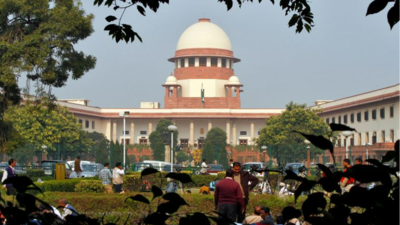- News
- India News
- Supreme Court: Must stick to timeline for UAPA sanction
Trending
Supreme Court: Must stick to timeline for UAPA sanction
The Supreme Court highlighted the need to adhere to timelines under the Unlawful Activities (Prevention) Act. It ruled that the seven-day periods for making recommendations and granting prosecution sanctions should be strictly followed. This measure aims to keep executive power in check and protect the rights of accused individuals.

SC: Govt must strictly follow timelines on UAPA sanctions
Timelines prescribed under Unlawful Activities (Prevention) Act (UAPA) are a way to keep a check on executive power and to protect the rights of accused persons and should be strictly followed, Supreme Court said on Monday.
UAPA stipulates a seven-day period for the authority concerned to make its recommendation in a case on the basis of materials gathered by the investigating officer, and another seven days for govt to grant sanction for prosecution. The bench, however, said the govt's decision to grant sanction for prosecution cannot be challenged just because it was done within a day of getting the report.
The bench, however, said the govt's decision to grant sanction for prosecution cannot be challenged just because it was done within a day of getting the report.
SC: Govt must strictly follow timelines on UAPA sanctions
Holding that the timelines prescribed under UAPA - seven day period for the authority concerned to make its recommendation on the basis of materials gathered by the investigating officer and a further seven days period for govt to grant sanction for prosecution on the basis of the report - are a way to keep a check on executive power and to protect the rights of accused persons, Supreme Court on Monday ruled that it had to be strictly followed.
"The timelines mentioned in Rules 3 & 4 of the 2008 Rules are couched in mandatory language and, therefore, have to be strictly followed. This is keeping in view that UAPA being a penal legislation, strict construction must be accorded to it. Timelines imposed by way of statutory Rules are a way to keep a check on executive power which is a necessary position to protect the rights of accused persons. Independent review by both the authority recommending sanction and the authority granting sanction, are necessary aspects of compliance with Section 45 of the UAPA," it said.
It noted that the 2008 Rules are unequivocal in both, using the word 'shall' as also providing a specific time period for both activities, i.e., making recommendation and granting sanction.
UAPA stipulates a seven-day period for the authority concerned to make its recommendation in a case on the basis of materials gathered by the investigating officer, and another seven days for govt to grant sanction for prosecution.

SC: Govt must strictly follow timelines on UAPA sanctions
Holding that the timelines prescribed under UAPA - seven day period for the authority concerned to make its recommendation on the basis of materials gathered by the investigating officer and a further seven days period for govt to grant sanction for prosecution on the basis of the report - are a way to keep a check on executive power and to protect the rights of accused persons, Supreme Court on Monday ruled that it had to be strictly followed.
A bench of Justices C T Ravikumar and Sanjay Karol, however, said that govt's decision to grant sanction for prosecution under Unlawful Activities (Prevention) Act cannot be challenged just because it was done within a day after getting the report.
"The timelines mentioned in Rules 3 & 4 of the 2008 Rules are couched in mandatory language and, therefore, have to be strictly followed. This is keeping in view that UAPA being a penal legislation, strict construction must be accorded to it. Timelines imposed by way of statutory Rules are a way to keep a check on executive power which is a necessary position to protect the rights of accused persons. Independent review by both the authority recommending sanction and the authority granting sanction, are necessary aspects of compliance with Section 45 of the UAPA," it said.
It noted that the 2008 Rules are unequivocal in both, using the word 'shall' as also providing a specific time period for both activities, i.e., making recommendation and granting sanction.
End of Article
FOLLOW US ON SOCIAL MEDIA










